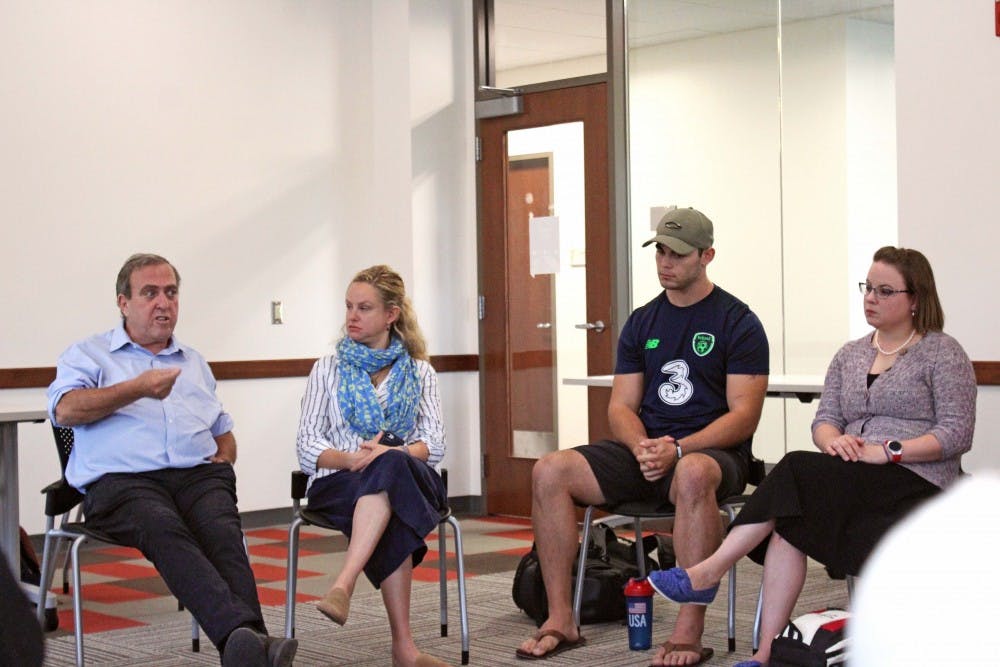The two men sitting side by side looked almost identical -- both in black pants, black shoes and light blue button-up shirts. Looking at them, one might never guess they were raised on opposite sides of a bitter political and social divide: the Israeli-Palestinian conflict.
Rami Elhanan and Mazen Faraj, along with Shiri Ourian -- the executive director of American Friends of the Parents Circle -- gathered in an intimate discussion last Wednesday with about 20 Miami students and faculty, many of them Jewish, to talk about their experiences.
The men were united by grief. Elhanan, an Israeli Jew, lost his 14-year-old daughter to a Palestinian suicide bomber. Faraj, a Palestinian Muslim, lost his father to a random shooting by an Israeli soldier. Many in their position would take these losses as all the more reason to hate the opposite side. But Elhanan and Faraj consider each other brothers.
The conflict behind it all has been raging in the Middle East for decades. It began when Jews, fleeing persecution in Europe, immigrated en masse to Israel, seeking to establish a national homeland. The native Palestinians objected and resisted their efforts.
Over the years this has resulted in war and constant violence. Today the main issues pertain to the Israeli and Palestinian occupied territories of Gaza and the West Bank, and the question of whether each group should have their own official state or states -- a feat that would be difficult to put into practice.
Year in and year out, Israelis and Palestinians are stuck in a cycle of violence, hatred and dehumanization that takes victims on both sides.
"There is a sea of blood between these two nations, the deepest hatred possible," Elhanan said.
Elhanan and Faraj are members and co-general managers of the Parents Circle -- Families Forum (PCFF), also known as the Palestinian Israeli Bereaved Families for Reconciliation and Peace, an organization founded to bring together Israeli and Palestinian families who have lost immediate family members to the ongoing conflict. They believe that before there can be peace, there must be reconciliation between the people of both sides.
"It's a conflict about life, it's a conflict about dreams, a conflict about who exists, about, 'Does no one care about the human side of these two societies?'" Faraj said.
The group also discussed the Boycott, Divestment and Sanctions (BDS) Movement -- a Palestinian activist group that boycotts against Israel -- and the core problems of hatred and prejudice that prevent a peaceful solution. At times, the atmosphere in the room grew tense, but Elhanan and Faraj always brought the discussion back to their message of forgiveness and reconciliation.
"They say in Arabic, 'You cannot clap your hands with one hand,'" Elhanan said.
Elhanan and Faraj have traveled to hundreds of schools to spread this message, including both Israeli and Palestinian high schools. There, they said, many students were usually far less receptive, having been personally affected by the conflict. It has proven difficult for people of both sides to overcome the wrongs done to them. But for Elhanan, Faraj and other members of PCFF, it is not impossible.
Enjoy what you're reading?
Signup for our newsletter
Before Faraj met Elhanan, he thought of him as his enemy. Now, 13 years later, he sees the world differently.
"I have a million reasons to hate the Israelis, but I have one reason to do what I'm doing," Faraj said. "Together with Rami and other members of the Parent's Circle [I've learned] how much we can trust each other and how much we can respect each other. I really devote my life to this mission."
Elhanan underwent a similar transformation.
"It was the first time I met Palestinians as human beings," he said. "[Now] this man beside me is my brother, probably the closest person to me on Earth."
After Oxford, the two men plan to travel next to Boston and then New York City to continue the conversation. As their time in Oxford came to a close, they left the community with a final message.
Elhanan's father was a survivor of Auschwitz. His father always remembered the apathy of European citizens who did nothing to stop what was happening there. He urged those gathered before him to not make the same mistake.
"We don't want you to be pro-Palestinian or pro-Israeli," he said. "We demand of you to be pro-peace."
arwinejk@miamioh.edu




